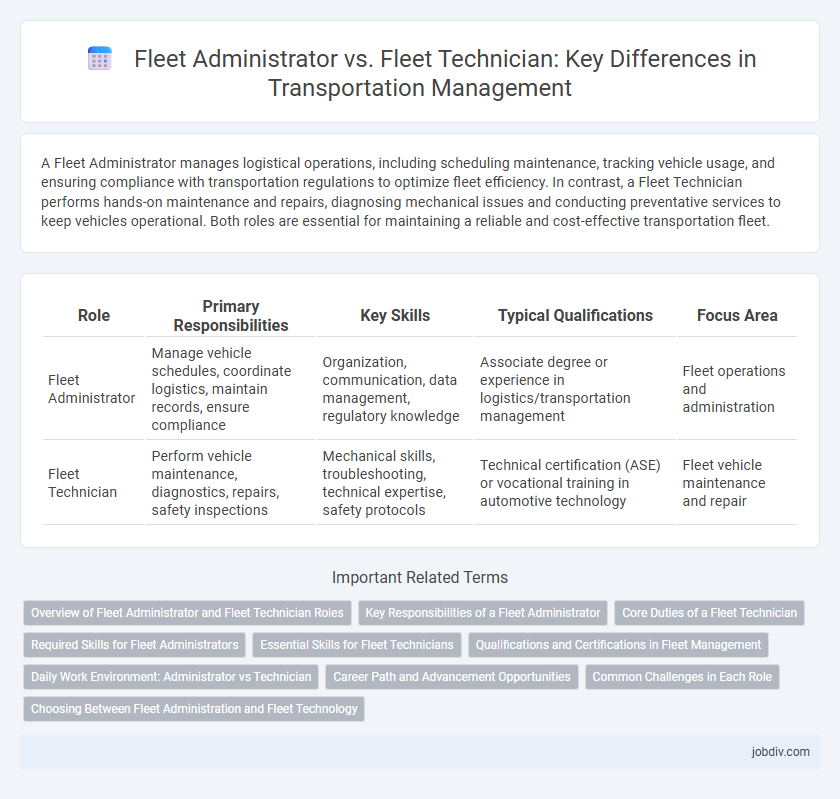A Fleet Administrator manages logistical operations, including scheduling maintenance, tracking vehicle usage, and ensuring compliance with transportation regulations to optimize fleet efficiency. In contrast, a Fleet Technician performs hands-on maintenance and repairs, diagnosing mechanical issues and conducting preventative services to keep vehicles operational. Both roles are essential for maintaining a reliable and cost-effective transportation fleet.
Table of Comparison
| Role | Primary Responsibilities | Key Skills | Typical Qualifications | Focus Area |
|---|---|---|---|---|
| Fleet Administrator | Manage vehicle schedules, coordinate logistics, maintain records, ensure compliance | Organization, communication, data management, regulatory knowledge | Associate degree or experience in logistics/transportation management | Fleet operations and administration |
| Fleet Technician | Perform vehicle maintenance, diagnostics, repairs, safety inspections | Mechanical skills, troubleshooting, technical expertise, safety protocols | Technical certification (ASE) or vocational training in automotive technology | Fleet vehicle maintenance and repair |
Overview of Fleet Administrator and Fleet Technician Roles
Fleet Administrators manage vehicle scheduling, maintenance records, and compliance with transportation regulations to ensure operational efficiency. Fleet Technicians perform hands-on inspections, repairs, and maintenance of vehicles to maintain safety and functionality. Both roles are essential for effective fleet management and minimizing downtime in transportation operations.
Key Responsibilities of a Fleet Administrator
A Fleet Administrator oversees the coordination and management of vehicle maintenance schedules, ensuring compliance with regulatory requirements and optimizing fleet operations. They handle vehicle registration, licensing, and documentation, while also managing budgets, vendor relationships, and tracking fleet performance metrics. Fleet Administrators play a critical role in strategic planning to improve efficiency, reduce costs, and support the overall transportation objectives of the organization.
Core Duties of a Fleet Technician
A Fleet Technician is responsible for maintaining and repairing vehicle fleets to ensure operational efficiency and safety, performing diagnostics, preventive maintenance, and emergency repairs. Core duties include inspecting mechanical systems, troubleshooting malfunctions, replacing faulty components, and maintaining detailed service records. This role directly supports fleet uptime and reliability, contrasting with the Fleet Administrator, who focuses on scheduling, compliance, and administrative management.
Required Skills for Fleet Administrators
Fleet Administrators require strong organizational and communication skills to efficiently manage vehicle schedules, maintenance records, and compliance documentation within transportation operations. Proficiency in fleet management software and data analysis enables them to optimize resource allocation and improve operational efficiency. Knowledge of regulatory standards and problem-solving abilities are critical to ensure fleet safety and cost-effective performance.
Essential Skills for Fleet Technicians
Fleet Technicians require strong mechanical aptitude, proficiency in diagnostic tools, and expertise in vehicle repair and maintenance to ensure fleet reliability. Essential skills include thorough knowledge of engine systems, electrical wiring, and preventive maintenance procedures to reduce downtime. Their ability to troubleshoot complex mechanical issues and perform timely repairs is critical for optimizing fleet performance and safety.
Qualifications and Certifications in Fleet Management
Fleet Administrators typically require certifications such as Certified Automotive Fleet Manager (CAFM) or Automotive Fleet Services Association (AFSA) credentials, paired with strong skills in logistics and compliance management. Fleet Technicians often hold certifications like Automotive Service Excellence (ASE) or Commercial Vehicle Technician credentials, emphasizing hands-on mechanical expertise and diagnostic skills. Both roles demand knowledge of OSHA regulations and Department of Transportation (DOT) standards to ensure fleet safety and regulatory compliance.
Daily Work Environment: Administrator vs Technician
Fleet Administrators primarily manage scheduling, compliance documentation, and communication with drivers, operating within office settings that emphasize multitasking and coordination. Fleet Technicians focus on hands-on vehicle maintenance, diagnostics, and repairs in service garages or workshops, often working with specialized tools and diagnostic equipment. The daily work environment for Administrators is structured and administrative, while Technicians experience dynamic, physically demanding conditions involving mechanical troubleshooting and safety inspections.
Career Path and Advancement Opportunities
Fleet Administrators typically oversee vehicle logistics, maintenance scheduling, and regulatory compliance, offering career advancement into roles such as Fleet Manager or Transportation Director with broader operational responsibilities. Fleet Technicians specialize in the repair and maintenance of vehicles, progressing toward senior technician roles, diagnostic experts, or maintenance supervisors, often requiring technical certifications for advancement. Both paths provide opportunities for growth within transportation management, with Administrators focusing on operational strategy and Technicians honing specialized technical skills.
Common Challenges in Each Role
Fleet Administrators often face challenges related to managing complex logistics, ensuring compliance with regulatory requirements, and maintaining accurate records for vehicle maintenance and driver performance. Fleet Technicians commonly encounter technical difficulties such as diagnosing mechanical issues, performing timely repairs, and staying updated with advanced vehicle technologies. Both roles require effective communication and coordination to minimize downtime and optimize fleet efficiency.
Choosing Between Fleet Administration and Fleet Technology
Choosing between a Fleet Administrator and a Fleet Technician depends on whether your priority is managing vehicle operations or maintaining mechanical functionality. Fleet Administrators focus on scheduling, compliance, and resource allocation to optimize overall fleet performance and cost-efficiency. Fleet Technicians specialize in diagnostics, repairs, and preventive maintenance, ensuring vehicle safety and minimizing downtime through technical expertise.
Fleet Administrator vs Fleet Technician Infographic

 jobdiv.com
jobdiv.com